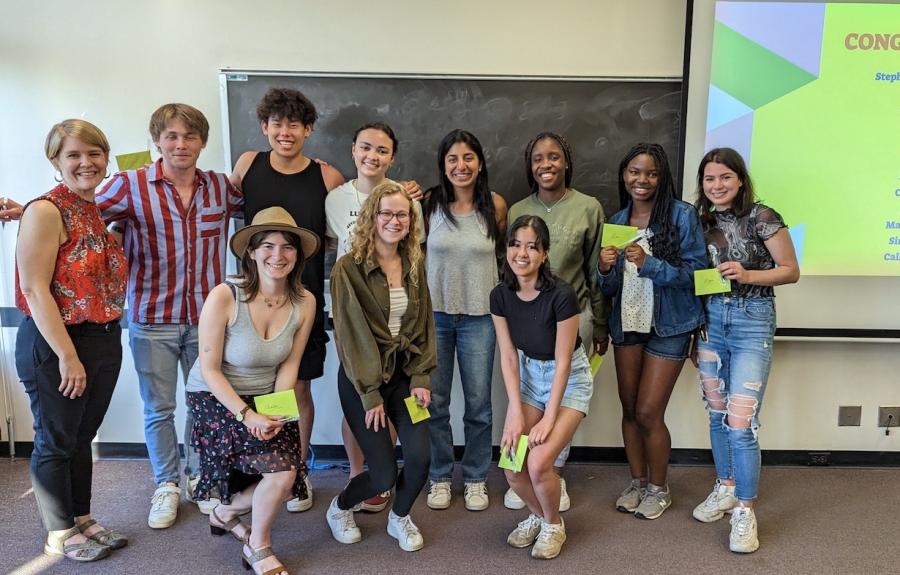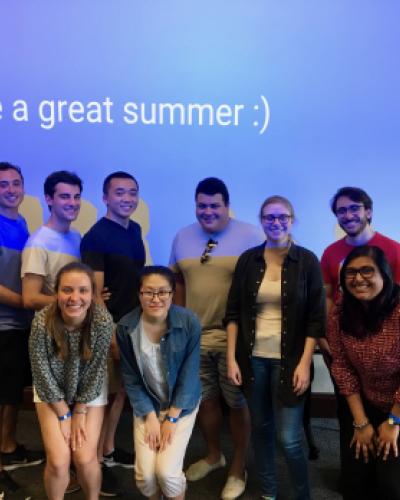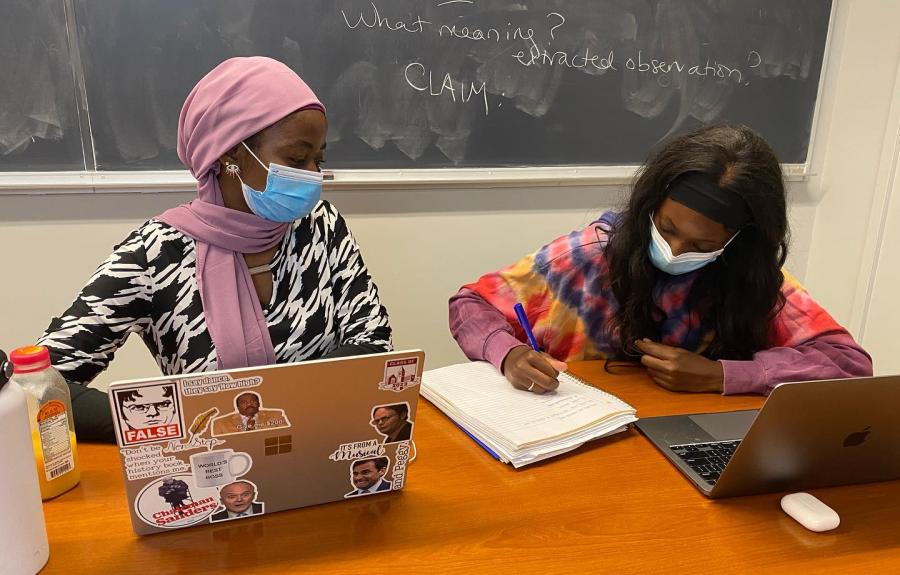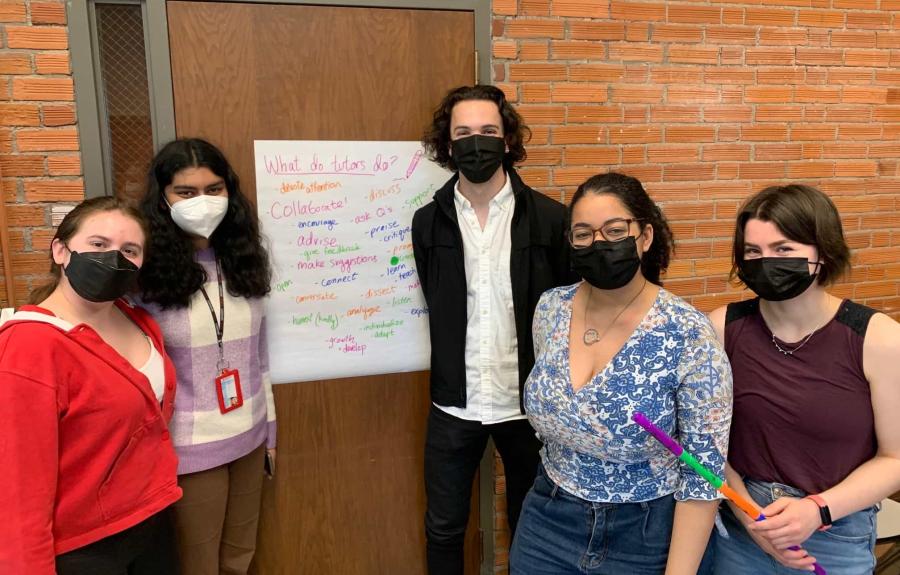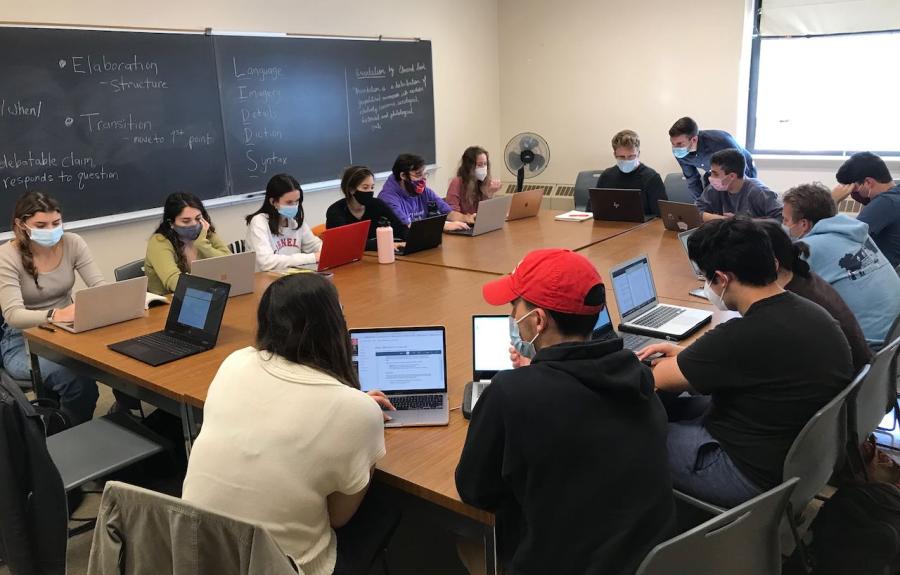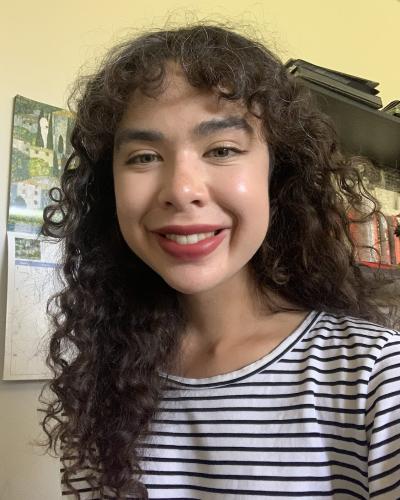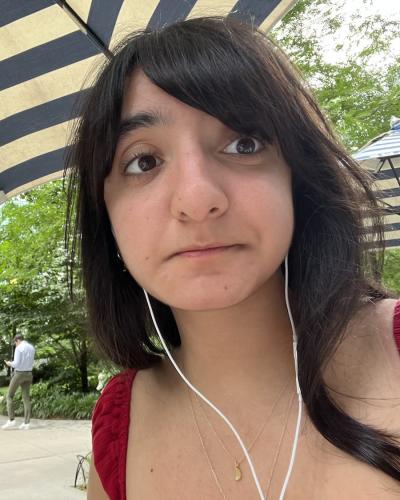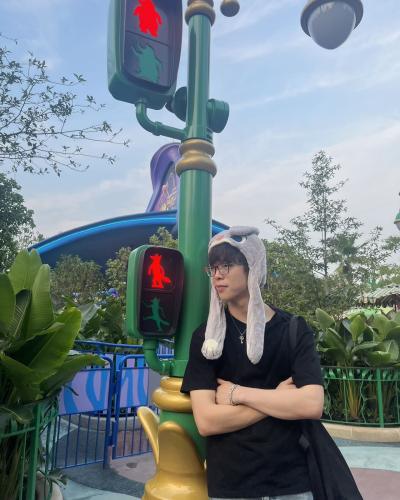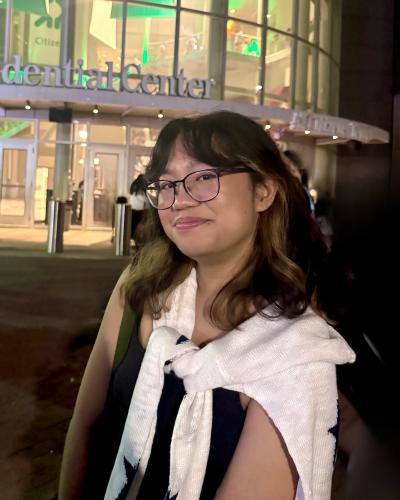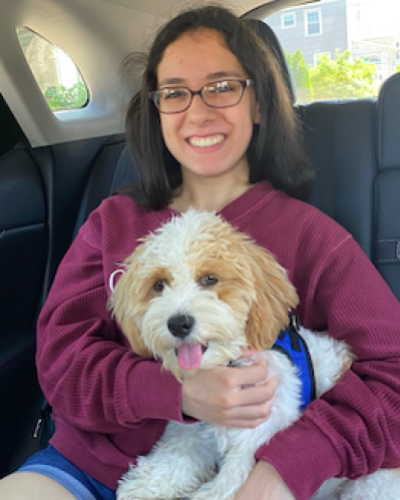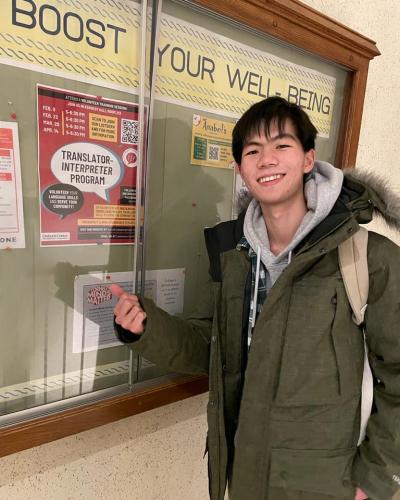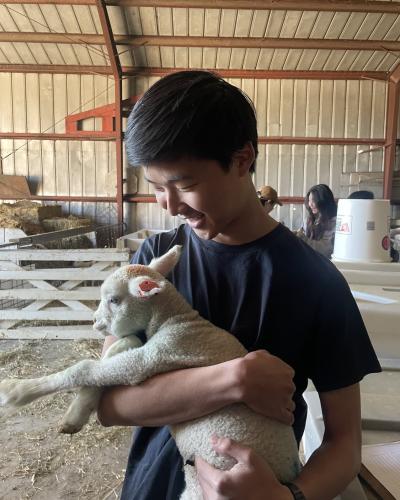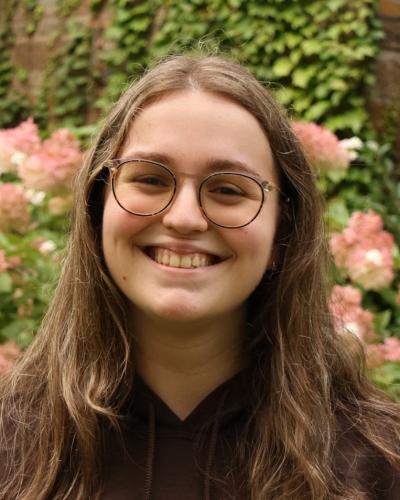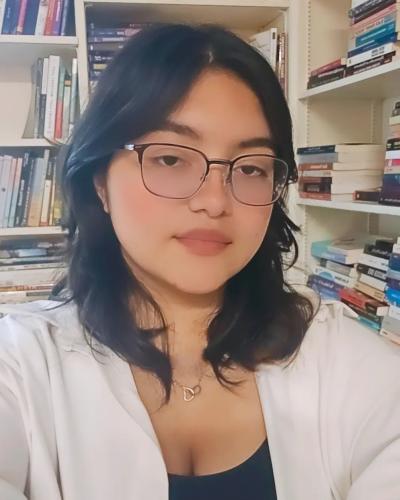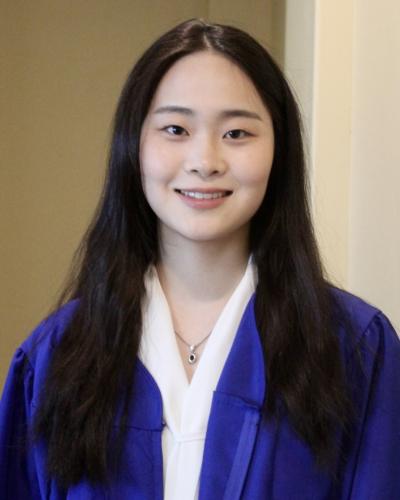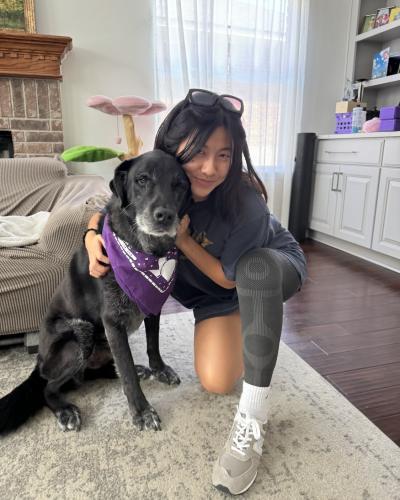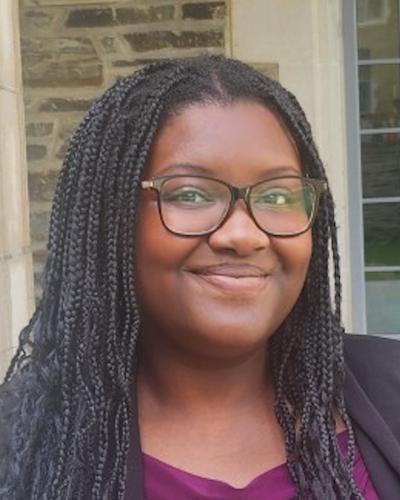The CWC provides support for individuals at any stage of the writing process. It is a free resource available to all of Cornell—undergraduate students, pre-freshman and high schoolers in summer programs, graduate students, staff, faculty, and alumni—for nearly any kind of writing project: applications, presentations, lab reports, essays, papers, and more. Tutors (highly trained undergraduate students) serve as responsive listeners and readers who can address questions about the writing process or about particular pieces of writing. They will ask questions that foster critical thinking about your writing, and they will also consider questions of confidence, reading, analytic thought, imagination, and research. All tutors have training in supporting multilingual writers, working with writers remotely online, and in supporting writers working on application materials.
Make an Appointment
For spring 2026, the Cornell Writing Centers will start tutoring on Monday, February 2. We have a highly trained staff of undergraduate tutors working at five campus locations and online. You're welcome to make an appointment or walk in to any of our locations during hours (see below schedule).
Tutoring Schedule
Fall 2025 Semester Schedule
| First Day of Tutoring | Monday, February 2 |
| No Tutoring: February Break | Friday, February 13 through Tuesday, February 17 (tutoring resumes Wednesday, Feb. 18) |
| No Tutoring: Spring Break | Friday, March 27 through Sunday, April 5 (tutoring resumes Monday, April 6) |
| Last Day of Tutoring | Tuesday, May 5 |
| Limited Exams Tutoring | May 6-8 and May 11-13 from 3-5pm in Rockefeller 178 |
Spring 2026 Location Schedule
Sundays—Thursdays, 7:00-9:00pm
- 108 Uris Library
- 403 Olin Library
- B06 Ruth Bader Ginsburg
- Online Shifts, via WC Online
Mondays—Thursdays, 3:00-5:00pm
- Mann Library Consultation Area
- 178 Rockefeller Hall
Fellowships Applications Tutoring with a CWC Tutor
An experienced and trained CWC undergraduate peer tutor, Theodore Lee (Theo), offers one-on-one consultations for students and young alumni applying to fellowships. Students can schedule online (virtual) application support here. Theo can help applicants at any stage of their drafting or revising process--to talk through ideas, refine focus, consider organization, and ensure examples support the writer's goals and values as an applicant. He can also help with stylistic choices, vocabulary, and any sentence-level concerns. Applicants can schedule regular or occasional appointments depending on preferred approach to writing support. Professional fellowships advising staff are available for one-on-one appointments and can be booked using the same link.
Fellowships Tutoring Schedule:
- Wednesdays & Thursdays 4:30-7:00pm in Rockefeller 172
This service is offered through Office of National Fellowships Advising.
AI Policy
The Cornell Writing Centers believe that writers using generative AI writing tools need to develop critical AI literacies, including the ability to use genAI tools throughout the writing process in ways that protect learning and thinking and that involve critically reading, analyzing, and revising all genAI output. CWC tutors are trained to facilitate ethical and responsible genAI-use when writers are interested in this work. While conversations about and use of genAI writing tools will be kept private, the CWC expects writers to know and adhere to individual faculty and course policies on genAI use and to be aware of Cornell’s broader guidelines on genAI use. We acknowledge that there are many legitimate concerns and ethical issues with genAI tools (e.g., environmental issues, inherent biases, and the narrowing of linguistic diversity); however, we hope to meet students where they are at and facilitate GenAI use that critically interrogates what genAI produces to ensure a writer’s ideas and voice are maintained.
Commitment to Combatting Linguistic Injustice
The CWC recognizes and values the rich diversity of writers at Cornell, who come from different educational, national, racial, cultural, and linguistic backgrounds with varying ways of thinking and being in the world. The CWC further acknowledges the racialized ways languages (and their users) are hierarchized based on white linguistic norms. To combat linguistic injustice, our tutors receive ongoing pedagogical training on how to ask questions and provide feedback that encourages writers to value and use their own languages and voices in ways that honor linguistic differences, seek growth in writing and thinking, and advocate for their right to their language. We are committed to respecting each writer as a whole person who has agency over their writing and language choices.
Writing Center Policies
The Cornell Writing Centers are generally flexible in our work with writers, but the following guidelines may help you to better understand how we function as well as some of our limitations.
Tutoring Times
Writers can only make a 60-minute appointment using our online scheduler, WC Online. We recognize that 60-minutes may seem like too much time and/or may be overwhelming. However, this requirement is to protect both your scheduled appointment time (for example, in cases where figuring out technology or wifi issues may take up 10-minutes in the beginning of the session) and to protect our tutors from fatigue. Further, the length of the actual session will be determined by what you bring to work on with the tutor (that is, you do not need to use the entire allotted hour appointment).
Writers are encouraged to only bring 4-6 pages of writing at a time. If you bring a longer piece of writing, we would strongly encourage you to have a smaller section that you'd like to work on. We believe that tutoring is best when the writer and tutor are working together to think through smaller sections.
Appointment Limitations
Generally, writers can only make two appointments per week through our online scheduling system, WC Online. Our goal is to help you understand how your piece of writing works and how you can revise it and grow as a writer. Growing as a writer involves reading and revising your writing on your own as well as working with a tutor; thus, we hope that the maximum of two appointments per week will encourage further time reading and thinking about your writing on your own. Further, we are a limited resource and want to ensure as many people as possible can make appointments.
We encourage writers to work with multiple tutors, rather than only making appointments with the same tutor for every session. We believe that getting multiple perspectives on your writing will prove more useful.
We encourage writers to cancel WC Online appointments no less than 8 hours before the scheduled appointment. Canceling your appointment, when necessary, is a courtesy both to the tutor and to other writers who may wish to make an appointment at that time. If you miss three appointments (without canceling them), your WC Online account will be automatically disabled.
Tutoring Pedagogy
Our tutors are trained to create a collaborative tutoring experience that is interactive and conversational. They will ask you questions about your larger argument and purpose in writing, how you're using evidence and analyzing, and how you're understanding particular vocabulary or language choices. We believe that writers learn about writing through both doing the work (writing, revising) and through talking about their writing and noticing the effect of certain choices. Thus, to get the most out of a tutoring session, we hope that you will come prepared to have a rich and engaging conversation about your writing!
Tutor Agency
The CWC also honors each tutor's agency to make decisions that represent a negotiation of what is best for both the tutor and the writer. This policy acknowledges that both tutors and writers are complex humans with varying needs when it comes to reading, writing, and communicating. That means, your tutor may ask you to print out your essay because that's how they read best, or a tutor may be willing to work with you for an extra half hour or they may need to be done immediately when their tutoring shift is done. Tutors, like writers, have individual reading and tutoring preferences as well as varying comfort levels with different types of situations--we encourage them, like you, to make purposeful decisions that all parties are comfortable with. While this policy does result in a variety of different practices and approaches to different situations, we hope that you'll respect each tutor's requests and sense of what they need, as they will also respect your choices about what you need.
WC Online Scheduling System
We use WC Online (https://cornell.mywconline.net/) for scheduling appointments and keeping track of the number of appointments we have each semester. If you came to the Writing Centers without an appointment, it is likely a tutor created a WC Online account for you in order to track the appointment. If you are trying to login to WC Online and can’t, simply use your Cornell email address and click on “Reset your password.” The “Reset your password” link is right below the login button.
Proof of Appointments
Generally, we do not support tutors (who are peers) providing teachers with proof of an appointment. Since we believe that peers are equals and tutors do not have power over their peers, tutors should not be asked to sign or authorize any documents that prove writers attended a session. However, writers can request that tutors email the writers their client report from, which the writer can use as they please. Client report forms are, generally, an internal document that summarizes and reflects on the tutoring session.
Online Tutoring
How Online Tutoring Works
Online tutoring is by appointment only, so to get started, writers need to register for an account and make an appointment.
Our online appointments offer the option for video-conferencing or text-box chatting, and in order to “show up” for an appointment, you simply need to login to the schedule, click on your appointment, and then click the yellow link that says “START OR JOIN CONVERSATION.” Our tutors will be prepared to help you navigate technology issues—they will email you to check-in and offer help should you have any trouble “showing up.”
Check-out this video demo for how to make and "show up" for an appointment:
Though we work hard to ensure smooth online appointments, due to the regularity of technical and other unforeseen issues, we ask all writers to make hour-long appointments. If technology/internet issues do arise or you're struggling to "show up," don't worry--our tutors are trained to reach out and help and they all have a back-up plan!
Become a Tutor
Interested in becoming a tutor? Here are some things our past tutors have valued in the work:
"As a writing tutor, I enjoy the one-on-one conversations and brainstorming sessions I have with writers from various disciplines. This experience has challenged me to not only quickly learn and dive into a topic that I am not too familiar with, but also tailor my advice to the writers' specific needs and goals. I have become a better writer and critical thinker thanks to this job!"
- Sichun Liu
"Being a writing tutor at WC makes me realize writing is not a solitary activity. It gives you access to the workings of so many brilliant minds."
- Qijia Yu
"It is incredibly satisfying to have a job as intellectually stimulating as being a Writing Tutor for the Knight Institute. As an international student studying mechanical engineering, I have worked with students of feminist studies, urban planning, music theory, English, and anthropology - to name a few. These interactions - where I get to learn as much as the students who come to the writing center - have allowed me to experience fully the breadth of a liberal arts university despite having a 'technical' major, and have greatly enriched my Cornell experience."
- Emad Masroor
Why Tutor?
As the above quotes indicate, tutors find this work to be rewarding for a number a reasons: working with writers from across the disciplines, the intellectual engagement of tutoring, the collaboration, professional development around pedagogy and writing, and the community! We have a vibrant and diverse tutoring community that participates in on-going professional development activities. This work is generative, creative, and an excellent opportunity for students interested in communication, writing, education, and collaborative learning.
Our undergraduate and graduate writing tutors provide support for a diverse pool of writers at various stages of the drafting process for nearly any kind of writing project. We operate out of five campus locations to offer thirty- to sixty-minute individual meetings. During tutorials, writing tutors typically:
- help writers get started with essays by reading and discussing a writing assignment, evaluating research material, or brainstorming an outline;
- discuss ways to shape coherent arguments, make strong use of evidence, and work with appropriate citation conventions;
- consider questions about depth of analysis, organization, thesis definition, audience expectations, paragraph development, stylistics, or sentence structure;
- offer specific strategies for diverse writers navigating different parts of the writing process, including brainstorming, drafting, revising, and editing;
- support both native and non-native speakers of English to identify patterns among errors in grammar or usage;
- and, help writers understand and address specific feedback from peers and teachers.
In short, writing tutors serve as responsive listeners and readers who can address questions about the writing process or about particular pieces of writing.
Job Descriptions
Writing Centers Tutor
- Tutors typically work 1-3 tutoring shifts a week. We currently have two tutoring shifts: 3:00-5:00pm or 7:00-9:00pm ET. Tutors usually work between 2-9 hours a week.
- New tutors must complete a 7-week, 1-credit training course (WRIT 2101, see below for details). Tutor training is only held in the spring, and begins when the 7-week courses start, midway through the spring semester.
- After completing the tutor training course (once hired), tutors are required to attend 4 (paid) staff meetings a semester. Staff meetings are usually at 5:30-6:30pm ET, on varying week nights. During these meetings, as a group, we discuss tutoring pedagogy and practice, workshop a variety of sample student writing, and reflect on tutoring experiences. Staff meetings deepen and extend the introduction to basic tutoring pedagogy and practice covered in WRIT 2101 (tutor training).
- Tutors get paid an hourly rate, and there is often the bonus of snacks and cookies at events.
Positions for Advanced Tutors
Knight Writing Mentor
Writing mentors are experienced CWC tutors who meet with assigned students for one or two hours each week for the duration of a semester or year to develop effective and sustainable writing habits and strategies. Undergraduate and graduate students can work up to 6 hours per week to support writers enrolled in First-Year Writing Seminars or other writing-intensive courses, and students working on substantial writing projects, like honors theses. Writing Mentors meet regularly for reflection on pedagogy and practice with Dr. Kate Navickas. Though mentors may start tutoring right away, they still are required to attend the same 7-week paid tutor training that new undergraduate writing center tutors do (this starts the week before spring break).
Graduate students, seniors, and current Writing Center tutors are encouraged to apply. Applications from juniors with relevant experience may also be considered.
Writing Centers Assistant Director
The Writing Centers regularly hire graduate students for the role of assistant director. The work involves 5 hours of administrative work per week. The position includes tasks like reviewing tutor applications, participating in tutor interviews, conducting peer observations, analyzing Writing Center data, leading tutor staff meetings, teaching or co-facilitating tutor training, and other necessary administrative work. Assistant directors meet regularly with the director, Kate, to select administrative experiences that align with the program’s needs and the TA’s interests as well as to reflect on the professional value of the experiences.
How to Apply
All tutor applicants must be matriculated Cornell students.
Undergraduate Students
- Undergraduate tutoring applications are only reviewed in the spring
- Prerequisite: Successful completion of at least one First-Year Writing Seminar
- Complete this application form
- DEADLINE: Spring 2026 deadline: Friday, February 6th.
Application Process: Applications will be reviewed after the spring deadline. A select number of applicants will be invited to sign-up for small-group interviews. The applicants who will be offered positions tutoring, will begin the 7-week tutor training course (WRIT 2101) after group interviews, roughly midway through the semester. Thus, the application and training process approximately takes a full semester. Newly hired tutors will begin tutoring during the exams period of the semester they get hired and trained. We hope to encourage tutors to apply early in their academic career and to continue tutoring throughout their time at Cornell.
WRIT 2101: Responding to Writing: Theory & Pedagogy (1 credit)
Course Description: This course introduces students to scholarship on writing pedagogy, requiring them to think critically about collaborative learning strategies, multilingual writing challenges, ethical considerations in peer tutoring, and the ways in which race and other facets of identity inform teaching and learning. The learning objectives include: develop an understanding of different theories of writing and the history of writing centers; practice reading and responding to a variety of different writing genres and student situations in ways that connect theory to practice; learn to question assumptions in specific pieces of writing, frameworks for writing, and in pedagogical interactions; self-reflect on individual writing processes, writing, and previous educational experiences; analyze the ways in which writer and tutor identities affect pedagogical interactions and learn strategies for equitable and ethical tutoring; develop confidence in suggesting interventions for other writers at various stages of their writing processes; and, gain flexibility in utilizing a variety of strategies for fostering writer agency and growth.
Spring 2025 Tutor Training Course Details:
- Starts the week of March 17
- Held weekly, on either Tuesdays or Wednesdays at 4:30-6:00pm (course day will be determined by selected applicant schedules)
- Knight Institute staff will enroll hired tutors
- Non-tutors interested in taking the course can email requests of interest to Dr. Navickas, ken43@cornell.edu
Graduate Students
- Prerequisite: successful completion of Writing 7100 or previous tutoring or teaching experiences.
- Submit a CV and letter of interest detailing relevant employment or coursework to Dr. Kate Navickas, ken43@cornell.edu
- DEADLINE: Applications accepted on a rolling basis.
CWC for Teachers
The Cornell Writing Centers (CWC) can help support you and your students through classroom visits and workshops, writing guides, and the Essay Response & Consultation Program. We are always excited to work with you to develop activities, workshops, or resources that are specific to your course and writing needs.
The CWC relies on support and promotion from faculty and instructors across campus; thus, we hope that you will continue to support our services and your students by including the CWC blurb (below) on your syllabus or Canvas site and by periodically reminding students about the work we do.
The Cornell Writing Centers Syllabus Blurb
The Cornell Writing Centers (CWC) provide support for individuals at any stage of the writing process. It is a free resource available to everyone on campus—faculty, staff, graduate and undergraduate students—for nearly any kind of writing project: applications, presentations, lab reports, essays, papers, and more. Tutors (trained peers) serve as responsive listeners and readers who can address questions about the writing process or about particular pieces of writing. They can also consider questions of confidence, assignment expectations, critical reading, analytic thought, and imagination. All writing tutors are also trained to work with multilingual writers writing in English and to help support application materials. Walk-ins are welcome, or you can make an appointment here: https://cornell.mywconline.net/
Request Bookmarks, Stickers, or Posters
To promote the CWC, we typically print promotional bookmarks, stickers, and posters each semester. All students in first-year writing seminars receive either a CWC bookmark or sticker each semester. If you would like us to send promotional materials to you for your course or to send posters to be hung in your building, please email Director Kate Navickas, ken43@cornell.edu.
Advice for Encouraging Students to Use the CWC
Making an appointment at the Cornell Writing Centers can be intimidating for students. When you talk about the value of tutoring, it helps to explain to students what they can expect. Here are some points we hope you might emphasize:
- Tutoring is not only for struggling writers, it's beneficial for all writers. All writers grow from sharing their work, talking about it, and getting feedback on it.
- Tutoring is interactive and collaborative because this leads to deeper learning and growth. Writers can expect tutors to ask them questions about their writing, ideas, understanding of the assignment, and hopes for a piece of writing. Tutors may also encourage writers to do some brainstorming, reading, and writing with them during the session as a way to get started on the work.
- Tutors will help with language-issues, grammar, syntax, and editing; however, they will do this in a collaborative manner. That is, a tutor will not silently line-edit someone's essay. The goal of tutoring is learning, which means they may ask questions about word choice, vocabulary, intention, and sentence-structure in order to help clarify meaning and discuss possible corrections. The expectation, though, is that the writer will be involved and in-control of their own writing.
- Tutors are highly trained undergraduate students who are incredibly friendly and love talking about writing!
Requiring Tutoring Appointments
The Cornell Writing Centers do not officially support requiring students to attend a tutoring session. There are several reasons why it may not be best to require students to get tutored. On a logistical level, we usually have two tutors for each shift at each location; requiring tutoring can lead to one location being overwhelmed, which isn’t great for either tutors or students. On a more pedagogical level, tutoring is primarily about fostering writer agency—that is, tutors are trained to help writers become better writers through the writer’s own work, efforts, writing and thinking. This type of learning environment works best when students make the choice for themselves to come to the Writing Centers. Sometimes, when students are required, they are resistant to feedback or less interested in discussing their work or actively engaging with their writing, which makes tutoring less effective.
While we discouraging requiring tutoring appointments, we do understand the value of giving students a slightly stronger form of motivation. We often hear stories of students who have had meaningful learning experiences through a tutoring session but would have never made an appointment if a teacher had not encouraged them to do so. Instead of requiring tutoring, though, we recommend offering a writing center appointment as extra credit. If you choose to do this, here is some advice:
- Make sure you review the above recommendations on what to expect from a tutoring session with all students. In particular, students need to expect an interactive and collaborative experience.
- Build in enough time so that students have a week or two to make an appointment. When students are given an extra credit assignment, but only have one weekend to get tutored, our locations get overwhelmed and students get frustrated.
- We strongly recommend that you ask students to do some short reflective writing after they have attended a tutoring session for extra credit. This reflective writing is useful for two reasons: first, educational research shows that reflection aids in learning; and second, their reflection can function as proof of their tutoring experience. Here is an example reflection prompt that you might ask students to complete after an appointment:
- After you visit the Cornell Writing Centers, write a 250-word reflection on the experience. You might consider any of the following questions to guide your writing: What were the most and least successful aspects of the session? What specific writing strategies did you and the tutor discuss? What specific revisions did you and the tutor discuss? How was the tutor's feedback similar to or different from the feedback you have received from classmates or me this semester? What do you plan to do differently after this tutoring session? Why?
- Tutors are not allowed to sign off on a student’s appointment. Undergraduate student tutors (who are peers) are not prepared to police, monitor, or evaluate students. So we strongly discourage teachers for asking for proof in the form of a signed slip of paper, etc. What a Writing Center tutor can do, however, is to send the writer a copy of their client report form. All tutors write up a summary of each session for our records, which they are allowed to email to the student. The student, then, is allowed to do whatever they want with that client report form (including sending it to you).
Writing Guides
The CWC has developed a select number of writing guides (with downloadable PDF handouts) on common writing skills. While these writing guides are written for student audiences, we encourage teachers to share them directly with students or to use them to develop in-class activities related to specific assignments. Further, we are happy to meet with teachers to discuss specific writing assignments or challenges and develop course-specific writing guides. For more information on course-specific writing guides, please contact Director Kate Navickas, ken43@cornell.edu.
Classroom Visits & Workshops
The CWC can also help foster productive and engaging small group writing workshops in your class! Kate Navickas, Director of the Cornell Writing Centers, along with some tutors, can schedule classroom visits that promote effective peer responses around higher order concerns, like focus, organization, the development of ideas, thesis sentences, using sources, etc. Tutors will work with and alongside small groups of students as they read and respond to each others' writing.
Workshops are limited by our schedules and capacity. When requesting one, we typically ask for:
- Two weeks notice
- Course days, times, and location
- Syllabus copy
- Assignment that students will be working on
- Teacher's understanding of writing skills to focus on
Contact Kate Navickas for more details.
Essay Response Consultation
The Essay Response Consultation enables instructors to sit down one on one with tutors to talk about student writing. Because tutors have a great deal of experience in reading student essays and teacher comments, they can usefully support instructors who want to deepen and extend strategies for commenting on student work. Instructors can work with tutors to:
- review a set of papers on which the instructor has already commented.
- discuss a set of papers when the instructor is in the process of providing response and evaluation.
Meet the Staff
The Cornell Writing Center tutors are a diverse group of primarily undergraduate students from across the disciplines. They are highly trained in tutoring pedagogy, completing both a required half-semester course and ongoing bi-monthly professional development. In addition to their training, tutors share a love of writing and a commitment to collaborative learning. If you're interested in joining our community, learn more about applying to become a tutor here.
Rachel Horner (she/her) CWC Assistant Director Rachel is a PhD candidate in music and sound studies. Her research investigates the intersection between sound, language, and identity, especially in the context of cultural festivals in Spain and Latin America. Rachel looks forward to continuing her work with undergraduate students to help them build confidence and develop their voices as writers (and as writing tutors). A musical theatre kid at heart, Rachel can often be found singing (usually to her cats) when she's not at the writer's desk! | ||
Grace Aiono (she/her) Grace is a College Scholar and French major studying how people read and write about medieval stories about women. She loves to cook, go to trivia, and spend time with friends. She is so excited to talk with students about their work and to help them write more confidently and clearly! | ||
Ethan Amoh (he/him) Ethan is a Chemistry major from Chantilly, Virginia. In his free time, he is often found watching historical/geographical videos on Youtube, listening to music from the Romantic period, or studying languages and culture. He is excited to be working at the Writing Center and getting to share his love of language and its functions with other students! | ||
Leah Badawi (she/her) Leah is a Government and English major in the College of Arts & Sciences from New York City. She is an aspiring author who loves researching ancient history, is a life-long fan of sci-fi and fantasy books (her favorite being Frankenstein), and has an unhealthy Mario Kart obsession. She can’t wait to learn from other writers and share her passion for the written word! | ||
| Meghan Barr Meghan is a Global Development major concentrating in Food and Agricultural systems in the College of Agriculture and Life Sciences from Queens, New York. In her free time, she enjoys painting, hiking, and film. She is excited to work with writers from various disciplines and help them develop confidence in their writing. | |
Cassandra Beckmann (she/her)
Cassandra (Cassie) is an ILR major from Athens, NY. Outside of the Writing Center, she rides on Cornell’s Equestrian team and volunteers with the Ithaca Youth Bureau. In her free time, she loves to hike and play guitar. As a tutor, she’s excited to work collaboratively alongside Cornell’s writers to help them with the next steps of their writing process. | ||
Ben Carrick (he/him) Meet Ben, a Public Policy major at the Brooks School from Syracuse, New York. When he’s not at the Writing Center, you can find him playing soccer with friends, studying in MVR, thrifting for cool finds, or hitting the trails for a hike. Ben can’t wait to meet new people and tackle some fun projects together! | ||
Ruby Chase Ruby is a Biology major in the College of Arts and Sciences with a focus on evolutionary biology and ecology. She enjoys running, water sports, painting and traveling. At Cornell she participates in Women’s Club Soccer, volunteers with Special Olympics and instructs SCUBA courses! She is a first year tutor excited to meet more members of the Cornell community and share her writing passion! | ||
Caroline Cheng (she/her)
Caroline is a computer science major from the Bay Area, California. In addition to the Writing Center, Caroline is involved in the Association of Computer Science Undergraduates and the Cornell International Affairs Society, and she enjoys drawing, swimming, and exploring the beautiful nature. She looks forward to collaborating with and supporting the growth of all writers! | ||
Carly Diago (she/her)
Carly is a psych major and Spanish minor in the College of Arts & Sciences from San Diego, CA. She is involved in psychology research across various labs at Cornell and beyond, notably studying child suggestibility in Cornell’s Child Witness and Cognition Lab and childhood anxiety in the Kalin Lab at UW-Madison. Outside of the writing center, you might find her TAing for a class, peer mentoring through the EARS program, practicing for an ear-splitting solo for a Mediocre Melodies concert, or (and this one is most likely) walking aimlessly across campus overthinking life’s most pressing questions. | ||
Anna Diorio (she/her)
Anna is a Psychology major, with a minor in Communication, and is from Westport, CT. Aside from the writing center, she works as a research assistant at the Cornell Behavioral Analysis of Beginning Years Lab. In her free time, she loves singing and playing piano, reading, spending time with friends, snacking, and crocheting. She’s excited to work with writers of all backgrounds and help them achieve their writing goals! | ||
Adowyn Ernste (she/her) Adowyn is a College Scholar and English major studying sound/image relationships and nonlinear structures in experimental film. In her free time, she loves writing songs on guitar, reading fantasy books, designing characters, and hugging her cats. Adowyn is excited to provide support, empowerment, and a listening ear to writers as they refine their ideas and their words. | ||
Kevin Feng (he/him) Kevin is an Economics & Statistics double major in the college of arts and sciences, from Shanghai, China. Outside of his work as a tutor, he is passionate about soccer (yay Man City!), frisbee, food, and traveling. Kevin is excited to support writers - particularly non-native speakers & writers - to achieve their writing goals and discover joy in the process! | ||
Juanita Florez-Bedoya (she/her) Juanita is a Biological Science major in the College of Arts and Sciences from Medellin, Colombia. In her free time, she enjoys dancing, building puzzles, and traveling. On campus, she is an active member of Sabor Latino Dance Ensemble, where she shares and celebrates her culture with others. She is looking forward to meeting writers from different backgrounds and helping them feel confident in their own writing. | ||
Stella Geronimo (she/her) Stella is a Human Biology, Health, and Society major from Old Lyme, Connecticut. Outside of the Writing Center, she is a member of E.Motion and the Cornell Filipino Association. She also enjoys playing the flute in her chamber flute orchestra on campus and volunteering as a certified EMT. As a tutor, Stella looks forward to helping writers amplify their voice in their work and discover the joys in the writing process! | ||
Jasmine Gill (she/her) Jasmine is a Human Biology, Health, and Society major from Basking Ridge, NJ. When she’s not tutoring, you’ll likely find her writing fantasy, lifting, or watching horror movies. She loves working with students and alumni from all backgrounds, and is excited to have plenty more enjoyable and productive sessions with the writing center’s tutees this semester! | ||
Caroline Gordon (she/her) Caroline studies biostatistics in the College of Arts & Sciences and is from Akron, Ohio. She’s passionate about tutoring writing, general chemistry, and English; outside of school and work, she enjoys jogging with audiobooks and listening to pop español, as well as solving Fermi problems and NYT puzzles. Caroline is stoked to help bring out the voices of Cornell’s diverse writers! | ||
Ajani Green-Watson Aj is an Economics and Africana Studies double major on the pre-law track. With a passion for music and songwriting, she loves to bring art and creativity into professional spaces, making the experience more authentic. Although from New York City, Aj loves to take pleasure in the slower, calmer things in life like nature walks, meditation, and journaling. To her, honest writing is a form of vulnerability and sharing your true thoughts enhances the human connection. | ||
Carolina Guerrero-Gomez (she/her)
Carolina is studying philosophy and psychology in the College of Arts & Sciences and is from Miami, Florida. Outside of tutoring, she enjoys being a part of the Cornell Rowing Club and loves to bake, crochet, and play the piano. She is looking forward to engaging with and supporting fellow peers and guiding them toward future success! | ||
Tania Hao (she/her) Tania is a Cognitive Science and Linguistics major in the College of Arts & Sciences and is from Ithaca, NY. Outside of the writing center, she is a staff writer for The Cornell Daily Sun and a violinist in the Cornell Orchestras. In her free time, she enjoys hiking, tennis and creative writing. Tania is excited about working with writers from a wide range of different disciplines! | ||
Lyn Huang (they/them) Lyn is a physics major concentrating in astronomy from Orange County, CA. If they’re not yapping away about translation theory or radio astronomy then they’re probably working on another unfinished book draft in Google Docs, their physics homework, error messages in Linux, or their ever-growing TBR. In the meantime, they’re looking forward to working with the many diverse writers visiting the writing center! | ||
|
| Niles Hite Niles is a Communication major in the College of Agriculture and Life Sciences. He comes all the way from Rockford, Illinois which is about 760 miles away, but he couldn't be any more grateful for the warmth the Cornell community has provided him all the way out here in Ithaca. In his free time he enjoys cooking, traveling, and reading essays. He's really excited to work with students at the writing center and hopes that he is able to show that no matter where someone is in terms of their writing ability- they too are just as much of a writer as anyone else. | |
James Hoehner (he/him)
James is studying food science and has side interests in lake ecology and science communication. He likes rollerblading, playing Wordle, and watching football & hockey. James is excited to help point you in the “write” direction on your next project! | ||
Benjamin Isaacson (he/him) Ben is a Biological Sciences major from Long Island, NY. Outside the writing center, he loves making music, telling mysteries, designing games, and talking about cats. He looks forward to getting to help writers bring their narratives to life! | ||
Wilson Kan Wilson is a government and economics major from Bethesda, MD. Outside the classroom, he is involved in the Translator Interpreter Program and co-facilitates the Cantonese conversation hour. An avid AvGeek, Wilson enjoys traveling and exploring the world around him in his spare time. He is very excited to work with Cornell’s diverse and talented writers! | ||
Madeleine Kapsalis (she/her)
Madeleine is from the suburbs of Chicago and a student in the College of Arts & Sciences majoring in English and minoring in French on the pre-law track. She enjoys writing her own realistic fiction novels, learning new languages, listening to house music, and journaling in her free time. On campus, you’ll most likely see her roaming around with a coffee in hand, studying at any of the beautiful libraries, or vlogging life’s happy moments. She can’t wait to work with writers and support their creative journey in any way possible! | ||
Nikita Khare (she/her) Niki is an ILR major from Ashburn, Virginia interested in labor history and law. On campus, she’s a member of Cornell Speech and works as an editor on a few student publications; in her free time, she enjoys painting and creative writing. She’s excited to collaborate with and offer an ear to fellow students on their writing. | ||
Meredith Knauff (she/her) Meredith is a double major in Biology and Music from Boston, MA. She loves all things music and is a member of the Cornell Symphony Orchestra, as well as the newly formed Cornell Cello Ensemble. In her free time, she loves running and reading, and is often found with an iced coffee. She is looking forward to helping writers develop their voice and find enjoyment in writing! | ||
Jonah Kosloff (he/him) Jonah is from Philadelphia, Pennsylvania, and is studying Government in the College of Arts & Sciences. In his free time on campus, he enjoys walking while listening to music or podcasts, creating art projects on a whim, and having deep, meaningful conversations with his peers. Jonah is excited to connect with the Cornell community through prose, and is passionate about ensuring every writer can express themselves authentically. | ||
Jaein Ku (she/her)
Jaein is an ILR major from Queens, NY. In addition to tutoring, she enjoys swimming, photography, playing the piano, and performing with the Cornell Orchestras as a double bassist. As a tutor, Jaein is enthusiastic about making writing a fulfilling and meaningful experience for her students. | ||
Emily Le Emily is a Biology major with an interest in medical research. She grew up surrounded by the outdoors and loves adventures in the Adirondacks, from sledding in the winter to kayaking in the summer. When she’s not outside, she’s probably with friends, whether it’s playing board games or just wandering around for fun. She’s excited to support writers as they grow and develop their voices! | ||
Theodore Lee (he/him) Theo is an Animal Science major from New York City. When he’s not staring down viruses in the vet school, you can probably find him poking around on an old bass guitar (or trumpet, sax, or piano), or out on a run on campus. | ||
Lucas Li (he/him) Lucas is a Linguistics and Computer Science major, as well as a Humanities Scholar, from Kitchener-Waterloo, Canada. As an international student, he is passionate about helping other multilingual writers with their work. Outside of being a writing tutor, Lucas works as a TA for Cornell Bowers CIS and a research assistant in the Computational Psycholinguistics, Natural Language Processing, and Phonetics labs where he studies how humans and machines process and formulate language. | ||
Kelly Li (she/her)
Kelly is an ILR major from New York City. Outside of the Writing Center, she is involved in the Cornell University Parole Initiative, Pulseguard, and Speech and Debate. In her free time, she likes to travel, spend time with friends and family, and try out new restaurants. She looks forward to working closely with writers across different disciplines and backgrounds. | ||
Hannah Meng (she/her)
Hannah is studying Government and Psychology in the College of Arts & Sciences and is from the Bay Area in California. She likes to spend her free time dancing, baking, hanging out with friends, and finding new study spots at Cornell. On campus, she’s involved with Big Red Buddies and the Phi Alpha Delta Pre-Law Fraternity. She’s excited to work with writers from all different academic backgrounds! | ||
Leslie Monter-Casio (they/she) Leslie is a Public Policy major in the Jeb E. Brooks School of Public Policy from the Eastern Shore of Maryland. Outside of the Writing Center, Leslie performs with the Mariachi Regional en Cornell University and is involved with advocacy work with MEChA, the Cornell Anti-Detention Alliance, and the Cornell ACLU. In their free time, Leslie enjoys crocheting tapestries, running, and portrait drawing. Leslie is beyond excited to help writers develop a positive attitude towards their work. | ||
Addison Morgenstern (she/her) Addison (Addy) is a History of Art Major from Bryn Mawr, PA. She loves working for layout at the Cornell Daily Sun, running and spending time at Cayuga lake with her friends. In her free time, you will likely find her painting, reading Vonnegut (‘43), or perfecting a new craft. She is looking forward to working with all kinds of writers and sharing her love of writing with others! | ||
Laura Orland (she/her)
Laura is a Materials Science and Engineering major from Philadelphia, PA. Besides tutoring, she is a part of the ChemE Car at Cornell project team, a member of the Cornell Materials Society, an undergraduate TA & researcher, and an avid hockey fan (Go Flyers!!). Laura can't wait to work with Cornell's talented and unique writers on their projects! | ||
Kira Pawletko (she/her) Kira is a Biological Sciences, Cognitive Science, College Scholar, and Psychology major in the College of Arts & Sciences from Greenwich Village and Syracuse, New York. Outside of the Writing Center, Kira is a Resident Advisor, TA, and Research Assistant in the Experience & Cognition Lab and loves learning about neuroscience. In her free time, Kira loves playing woodwind instruments, training in mixed martial arts, learning foreign languages, and getting boba with friends. She loves being a tutor and can’t wait to work with Cornell’s awesome writers! | ||
Ava Perez (she/her) Ava is an Animal Science major from Brooklyn, New York. Aside from being a tutor, she is the President of VAW Global and works at veterinary clinics to help animals in need! In her free time, she loves to read fantasy and dystopian novels, watch TV shows, and take walks in nature. She’s ecstatic to meet students and encourage writers to always believe in their work and themselves. | ||
Yvette Reyes (she/her) Yvette (Yv) is a double major in English and Anthropology, with a minor in Education, and is from Donna, TX. Aside from the Writing Center, she is involved in several clubs, including Mariachi en Cornell, being the President of the Guild of Visual Arts, and the President of Kitsch Magazine. When she’s not in class or at clubs, you can find her on the phone with her long-distance boyfriend or at the library helping her friends and classmates with their writing assignments. | ||
Catherine Seo (she/her) Catherine is a Mechanical Engineering major with a minor in Robotics and is from Boise, ID. Outside of the Writing Center, she is a member of the CUAUV (Autonomous Underwater Vehicle) project team, the Architecture Student Practice Club, Maker Club, and the Society of Women Engineers. She is also an undergraduate researcher in the Architectural Robotics Lab, an Autodesk Ambassador, and an insect enthusiast. She might always be busy working in the Experiential Learning Lab, but in her free time she loves playing ping pong and chatting with her friends. Catherine is passionate about working with writers across all disciplines and backgrounds, helping them see writing as a tool to express their voice rather than something intimidating. She is excited to see all tutees grow as effective communicators! | ||
Julian Seyoum (he/they) Julian is an English major within the College of Arts and Sciences, coming from Clifton Park, New York. In his free time, he enjoys writing, reading, drawing, crocheting, and acting. He has a stack of unfinished books to read, alongside endless WIPs saved in Google Drive! Julian loves discussing reading and writing with others, and is looking forward to offering his peers aid within the Writing Center. | ||
Ajay Sharma (he/him) Ajay is an Economics, Philosophy, and Mathematics major in the College of Arts & Sciences from Basking Ridge, NJ. On campus, he dances on the Big Red Raas competitive dance team and is a member of the Cornell Political Union. In his free time, he enjoys soccer, photography, and pickleball. He’s excited to support writers across different disciplines with any project they’re working on! | ||
Henry Tan (he/him)
Henry is a Malaysian double majoring in Economics and Statistical Science. When he’s not doing data analysis and visualization, he gets involved in Cornell REAL A Cappella and enjoys reading at the Math Library. He’s excited to meet students from different disciplines and writing styles and learn about their thoughts and opinions. | ||
Sanjana Vittal Sanjana is a Computer Science major in the College of Arts & Sciences from East Windsor, New Jersey. At Cornell, she plays on the Chess Team and is a Rawlings Presidential Research Scholar. In her free time, Sanjana loves dancing, ice skating, and reading mysteries. She is looking forward to meeting and working with new writers at the Writing Center! | ||
Thomas Vollaro (he/him) Thomas is an ILR major from Westchester, NY interested in law and psychology. On campus, he is a sports writer for The Daily Sun and a member of Big Red Ambassadors. In his free time, he enjoys swimming, watching sports, and reading. Thomas is excited to work with students across disciplines and collaborate with them at any stage of the writing process! | ||
Finley Williams Finley is an American Studies major concentrating in the relationship between popular culture and cultural change. When she’s not tutoring, she enjoys hiking, biking, crocheting, and writing prose. She can’t wait to continue helping writers explore and hone their voices! | ||
Kyleena Xin (she/her) Kyleena is a double major in computer science and sociology from San Antonio, Texas. Outside of the writing center, she is a part of the women’s club soccer team and loves to cook, crochet, and journal. Kyleena is absolutely thrilled to support and guide her peers toward success in the writing world! | ||
Kosie Yeboah (She/her) Kosie is a Government and Sociology Major in the College of Arts and Sciences from New Jersey. Outside of her role as a Writing tutor, Kosie is a Peer Ambassador for the College of Arts and Sciences, a Research Fellow for the Center for Global Democracy, and works as an editor for some student publications on campus. In her free time, she enjoys reading African Literature and photography. She is excited to work with writers across different disciplines at Cornell! |

